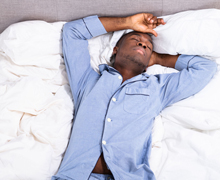
Stress is common for college students, especially around exam time, and that stress may lead to an increase in blood pressure. The fix turns out to be as simple as getting a little more of something students give away freely during college - sleep.
Researchers at Penn State found an increase of 43 minutes per night of sleep for college students in their study equated to a drop in systolic blood pressure of seven points. Not surprisingly, the extra sleep also meant the students experienced less sleepiness during the day.
Anne-Maria Chang, assistant professor of biobehavioral health and nursing at Penn State said in the report published in the journal Sleep Health that getting additional sleep is a realistic and important goal for most college students. Chang said not getting enough sleep is responsible for affecting a student’s mood and cognitive performance among other things.
"A relatively minor commitment to get a little more sleep can make a real impact on improving your health," Chang said. "Our participants were young and healthy and still saw significant, clinically relevant improvements. That, to me, really highlighted the fact that longer sleep, especially if you're not getting enough, can lead to physiological changes."
The consensus of most sleep experts is adults should be getting between seven and nine hours of sleep per night. While Chang said getting enough sleep is an issue for people of all ages, previous research has revealed 36 percent of young adults are getting less than seven hours of sleep and 14 percent are getting less than six hours per night.
"Mood is something that's of concern in this group with anxiety being so prevalent," Chang said. "Not getting the right quantity or quality of sleep affects cognitive performance, as well. Studies have shown sleep loss is related to poor grades, poor performance, and lack of effort and motivation. Also, other health behaviors like risky behavior, diet and eating behaviors, and sedentary behavior are all tied to lack of sleep or poor sleep."
Researchers recruited 53 healthy undergraduate students and tracked weight, blood pressure and heart rate during the study. They were given accelerometers to wear on the wrist to track their movement and sleep.
Participants were asked to keep their normal sleep schedule the first week. The students returned to the lab a week later and the data from the accelerometers was downloaded and the vital signs were again recorded. They were then asked to get an extra hour of sleep each night the following week.
Researchers found 77 percent of the students added at least 15 minutes to their nightly total while 66 percent added at least 30 minutes. They reported less sleepiness and saw a big improvement in blood pressure.
“We were really blown away by the blood pressure results," Chang said. "Not only were the results statistically significant but they were also clinically relevant. Seven points is a large change in systolic blood pressure."
"Not getting enough sleep is a real problem for students," Chang said, "and I think we've shown that given the opportunity, education and encouragement, college students can change the way they prioritize sleep. I think this can have a wider scope beyond the people who participated in the study. Hopefully other people will see that sleep can have a real effect on their health, it's something they can do."
